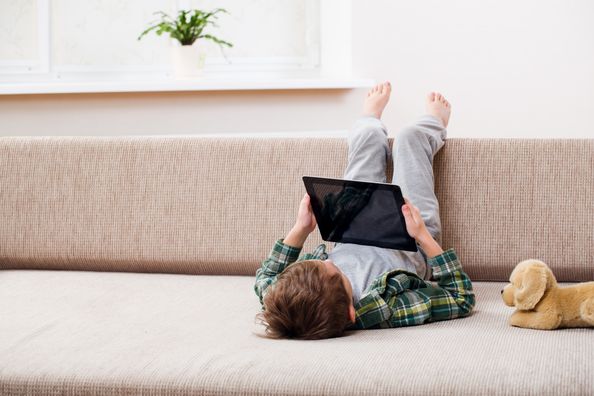At no point in history have humans had such easy and constant access to news, information, entertainment, and singing goat videos as we do now? Gaming systems, smartphones, tablets, laptops, and smart TV’s – these devices allow us to see and do things previous generations could never have imagined. It blows my mind that I can ask Siri what a word means and get an answer without even picking up my phone. Anyone else adore that you can set an alarm, apply for a loan, shop for underwear, watch a movie, talk with anyone you’ve ever met (or anyone you’ve never met), play games, and take high-quality photos all on the same device?
Technology Is Amazing Isn’t It!?
Except that all of these technological advances are one of the biggest risks facing kids today. Excessive screen time is associated with the following emotional and behavioral problems:
- Sleep problems
- Depression symptoms, such as irritability, sluggishness, and social withdrawal
- Decreased ability to tolerate boredom
- More access to negative social situations like bullying
- Constant comparison to others (via social media)
- Poor self-esteem
- Poor social skills development
- Higher risk of victimization
- Decreased interest in previously enjoyed activities
- Exposure to the potentially traumatizing material and inaccurate information
- Meltdowns and power struggles
- Increased aggression
Though there would be benefits to a screen-free lifestyle, you don’t have to eliminate electronic use in your home to reduce the negative impact of electronic devices on your kids’ behavior and mood:
- If your child is little and does not yet have access to an iPad or tablet, keep it that way. For as long as possible. Exposure to this kind of technology can literally change their brains and negatively influence readiness to learn.
- What about educational games, you ask? Well, as I said, put that off for now, as there will be plenty of time for those later. Spend time reading stories with your child instead.
- If little ones are already using electronic devices, keep it limited to small amounts of time, only educational games, and only if you are there interacting with your child. When electronic devices are used as babysitters, important developmental milestones and bonding opportunities are missed.
- Regardless of the age of your child, model appropriate screen time behaviors. Practice what you preach and put down that device! As soon as you finish reading this post, that is.
- Once you introduce electronics, use them to your benefit. Save them for when it is beneficial for your kids to be quiet and sedentary, such as allowing tablet time during long car rides, in waiting rooms, and at restaurants. Making it a special occasion activity helps kids to appreciate the privilege more.
- Computers, devices, televisions, and video games should be kept in a community area of the house such as the living room or a family den. Keeping these things in children’s bedrooms dramatically increases the risk of the problems listed above.
- Children should be given a clear set of rules and expectations with any new electronic device.
- Set and enforce time limits consistently.
- Children and teens should not have free access to their devices during the night. This rule is not popular and has been known to cause some fireworks when implemented. But kids who surrender their devices at bedtime get more quality sleep which is important for development and mood regulation. You’re going to need a better argument than that when you break it to your kid that they have to turn over their phone at 8pm but this is one battle worth picking.
- Homework and other responsibilities should be completed first. Many parents report their kids are more able to focus on homework when electronic use is confined to the weekends.
- Provide children with information about the risks of too much screen time as soon as they start to use it.
- Teach and remind kids early to take regular breaks, rest their eyes, and move their bodies to offset these risks. A “brain break” every 15 to 20 minutes can help prevent the irritability and sluggishness that comes with excessive screen time.
- Parents should have access to passwords, PINs, and sign-in information AT ALL TIMES. Teens will not appreciate this. But even if they pay for their own device and/or internet service, it is simply unsafe for them to have this degree of privacy. Make this non-negotiable.
- Parents should check phones and devices on a daily basis, especially at first. When your child has earned your trust, these checks can be less frequent and on a more random basis.
- FOLLOW THE AGE GUIDELINES FOR VIDEO GAMES. THEY ARE THERE FOR A REASON. I’m sorry I keep yelling at you, it’s just that I think this is one of the MOST FREQUENTLY (there I go again) overlooked guidelines.
- Though it may be hard to identify exactly when your child is ready for this kind of privilege – remember it is just that, a privilege, not a right – their behavior can tell you when they aren’t. Sneaking, lying, and breaking the agreed upon rules are signs that your child is not ready. These behaviors suggest it might be necessary to reduce time limits and provide more supervision and monitoring of their electronic use.
For additional age-specific guidelines, check out: Internet Safety 101: Age-Based Guidelines
Thanks for reading!
Nikki
Health Topics:







